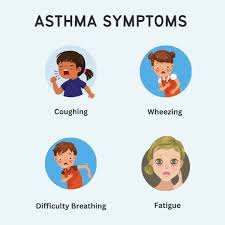Asthma is a chronic respiratory condition characterized by inflammation and narrowing of the airways, leading to a variety of symptoms. The common symptoms of asthma, described in detail, are:
1.Shortness of Breath:
- This is a sensation of not being able to get enough air into the lungs. It often occurs suddenly and can be particularly distressing. During an asthma attack, the airways narrow, making it difficult to breathe in and out effectively.
2. Wheezing:
- Wheezing is a high-pitched whistling or squeaky sound that occurs when breathing, especially when exhaling. This sound is caused by the air moving through narrowed or obstructed airways. Wheezing is one of the hallmark signs of asthma.
3.Coughing:
- Persistent coughing is common in asthma, often worse at night or early in the morning. The cough can be dry or productive (with mucus). In some cases, coughing may be the primary or only symptom of asthma, which is referred to as cough-variant asthma.
4. Chest Tightness:
- Many people with asthma describe a feeling of tightness, pressure, or discomfort in the chest. This can feel like a heavy weight on the chest and may make it difficult to take deep breaths.
5. Increased Mucus Production:
- Asthma can cause the airways to produce more mucus than normal, which can block the airways and make breathing more difficult. This mucus can be thick and sticky, contributing to coughing and wheezing.
6.Difficulty Sleeping:
- Asthma symptoms often worsen at night, which can lead to difficulty falling or staying asleep. Nocturnal asthma symptoms like coughing, wheezing, and shortness of breath can disrupt sleep and lead to fatigue during the day.
These symptoms can vary widely in severity and frequency among individuals with asthma. Some people may experience symptoms only occasionally, while others may have persistent and severe symptoms that interfere with daily activities. Additionally, certain triggers such as allergens, exercise, cold air, respiratory infections, smoke, and stress can exacerbate asthma symptoms, leading to an asthma attack or flare-up.





Comments